Related Research Articles
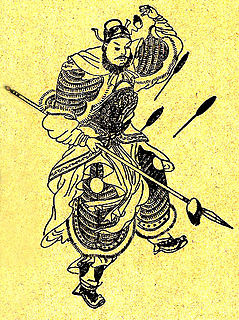
Zhang He, courtesy name Junyi, was a military general serving under the warlord Cao Cao in the late Eastern Han dynasty of China. He continued serving in the state of Cao Wei under its first two rulers, Cao Pi and Cao Rui, during the Three Kingdoms period until his death.

Xu Huang, courtesy name Gongming, was a Chinese military general serving under the warlord Cao Cao in the late Eastern Han dynasty of China. He later served in the state of Cao Wei during the Three Kingdoms period under the first two rulers, Cao Pi and Cao Rui, before his death at the start of Cao Rui's reign. Xu Huang is best noted for breaking the siege at the Battle of Fancheng in 219 by routing the enemy commander Guan Yu on the field.
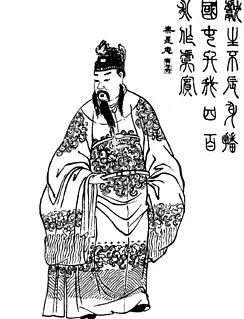
Emperor Xian of Han, personal name Liu Xie (劉協), courtesy name Bohe, was the 14th and last emperor of the Eastern Han dynasty in China. He reigned from 28 September 189 until 11 December 220.

Xiahou Yuan, courtesy name Miaocai, was a Chinese military general and politician serving under the warlord Cao Cao in the late Eastern Han dynasty of China. He is known for his exploits in western China in the 210s, during which he defeated Cao Cao's rivals Ma Chao and Han Sui in Liang Province and the surrounding areas, and forced several Di and Qiang tribal peoples into submission. He was killed in action at the Battle of Mount Dingjun while defending Hanzhong Commandery from attacks by a rival warlord Liu Bei. Xiahou Yuan's death was highly dramatised in the 14th-century historical novel Romance of the Three Kingdoms, in which he was slain by Liu Bei's general Huang Zhong during a surprise raid.
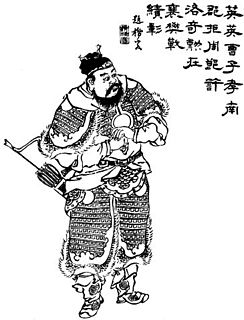
Cao Ren, courtesy name Zixiao, was a military general serving during the late Eastern Han dynasty of China under the warlord Cao Cao, who was also his older second cousin. He continued serving in the state of Cao Wei – founded by Cao Cao's son and successor, Cao Pi – during the Three Kingdoms period. He played a significant part in assisting Cao Cao in the civil wars leading to the end of the Han dynasty. He was appointed as the Grand Marshal (大司馬) when Cao Pi ascended the throne, and was also credited by the latter for the establishment of Wei. However, Cao Ren was also once derided as a mediocre commander by Zhu Huan, a general from Wei's rival state Eastern Wu.

Xu Chu, courtesy name Zhongkang, was a Chinese military general who lived during the late Eastern Han dynasty and the Three Kingdoms period of China. He started his career as a bodyguard to the warlord Cao Cao and later became a general in the state of Wei during the Three Kingdoms period. He was described to be a big and strong man, yet simple minded and honest, so he was nicknamed "Tiger Fool" by his men. After his death, he was posthumously honoured with the title "Marquis Zhuang", which literally means "robust marquis".
Yue Jin, courtesy name Wenqian, was a military general serving under the warlord Cao Cao in the late Eastern Han dynasty of China. He was noted as much for his short stature as for his valour and ferocity on the battlefield. Yue Jin participated in most of Cao Cao's early military exploits, and gained multiple successes in the campaigns against Lü Bu, Liu Bei, remnants of the Yellow Turban rebels, and Yuan Shao and his associates. He was particularly praised as a capable vanguard, but his most famed accomplishment came with his supporting role in the defence of Hefei against Sun Quan's forces at the Battle of Xiaoyao Ford of 214–215.
Lü Fan, courtesy name Ziheng, was a Chinese military general and politician serving under the warlord Sun Quan during the late Eastern Han dynasty of China. He continued serving in the state of Eastern Wu during the early Three Kingdoms period.

Zhang Xiu was a military general and minor warlord who lived during the late Eastern Han dynasty of China. In 197, he clashed with the warlord Cao Cao, who was then the de facto head of the Han central government, at the Battle of Wancheng and subsequent skirmishes. However, in 200, he heeded the suggestion from his adviser Jia Xu and surrendered to Cao Cao, who accepted his surrender and appointed him as a general. Having fought on Cao Cao's side at the decisive Battle of Guandu against a rival warlord Yuan Shao and in the subsequent campaigns against Yuan Shao's heirs, Zhang Xiu made great contributions during his service under Cao Cao. In 207, he died en route to joining Cao Cao on a campaign against the Wuhuan tribes. The Han imperial court honoured with the posthumous title "Marquis Ding".
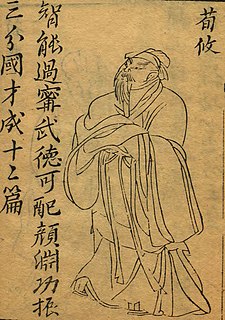
Xun You (157–214), courtesy name Gongda, was a statesman who lived during the late Eastern Han dynasty of China and served as an adviser to the warlord Cao Cao. Born in the influential Xun family of Yingchuan Commandery, Xun You was recruited into the civil service by the general He Jin. When the warlord Dong Zhuo hijacked and controlled the Han central government between 189 and 192, Xun You plotted with four others to assassinate him but was discovered and imprisoned. Following his release after Dong Zhuo's death, he wanted to serve as the Administrator of Shu Commandery but eventually settled as an official in Jing Province.
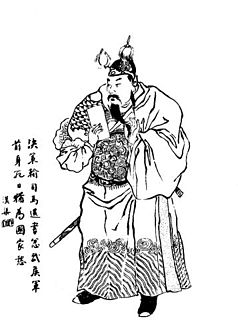
Cao Zhen, courtesy name Zidan, was a military general of the state of Cao Wei during the Three Kingdoms period of China. He was an adopted son of Cao Cao, a warlord who rose to power in the late Eastern Han dynasty and laid the foundation for Wei. After Cao Cao's death and the end of the Eastern Han dynasty, Cao Zhen served under Cao Pi and Cao Rui, the first two emperors of Wei. He is best known for leading a successful defence of Wei from the first two of a series of invasions by Wei's rival state, Shu Han, between 228 and 229.
Cao Xiu, courtesy name Wenlie, was a Chinese military general of the state of Cao Wei in the Three Kingdoms period of China. A distant younger relative of the warlord Cao Cao, Cao Xiu started his career in the late Eastern Han dynasty as a military officer under Cao Cao. In the early stages of the Hanzhong Campaign of 217–219, he outwitted Zhang Fei and defeated his subordinate officer Wu Lan (吳蘭). Later in his career, he became a provincial-level military commander and fought in various battles against Wei's rival state, Eastern Wu. He died in 228 shortly after the Wei defeat at the Battle of Shiting.

Jia Xu, courtesy name Wenhe, was an official of the state of Cao Wei during the early Three Kingdoms period of China. He started his career in the late Eastern Han dynasty as a minor official. In 189, when the warlord Dong Zhuo took control of the Han central government, he assigned Jia Xu to the unit led by Niu Fu, his son-in-law. In 192, after Dong Zhuo was assassinated by Lü Bu, Jia Xu advised Li Jue, Guo Si and Dong Zhuo's loyalists to fight back and seize control of the imperial capital, Chang'an, from a new central government headed by Lü Bu and Wang Yun. After Li Jue and the others defeated Lü Bu and occupied Chang'an, Jia Xu served under the central government led by them. During this time, he ensured the safety of the figurehead Han emperor, Emperor Xian, who was being held hostage by Li Jue. He also attempted to prevent internal conflict between Li Jue and Guo Si, but with limited success. After Emperor Xian escaped from Chang'an, Jia Xu left Li Jue and briefly joined the general Duan Wei before becoming a strategist of the warlord Zhang Xiu. While serving under Zhang Xiu, he advised his lord on how to counter invasions by the warlord Cao Cao, who had received Emperor Xian in 196 and taken control of the central government. In 200, during the Battle of Guandu between Cao Cao and his rival Yuan Shao, Jia Xu urged Zhang Xiu to reject Yuan Shao's offer to form an alliance and instead surrender to Cao Cao. Zhang Xiu heeded his advice. Jia Xu then became one of Cao Cao's strategists.
Zang Ba, courtesy name Xuangao, was a military general who lived during the late Eastern Han dynasty and Three Kingdoms period of China. He served the warlord Tao Qian initially, followed by Lü Bu and finally Cao Cao and his successors, but for the most part of his career, he remained semi-autonomous over his troops and eastern China. The years of his birth and death are not recorded, but he served the state of Cao Wei in the Three Kingdoms period until the reign of the second Wei emperor, Cao Rui. During his life he was granted autonomous power over Qing and Xu provinces. He eventually held the title of marquis of various counties within, but by the time of his death held the appointment Bearer of the Mace. Zang Ba was known for being an arrogant general, but also a powerful regional leader who contributed much to the state of Cao Wei. He was a rare case in which an insolent subordinate like him enjoyed a good ending.
Xiahou Shang, courtesy name Boren, was a Chinese military general and politician of the state of Cao Wei during the Three Kingdoms period of China. He was a distant younger relative of Xiahou Yuan and a close friend of Cao Pi, the first emperor of the Cao Wei state.

Cao Hong, courtesy name Zilian, was a Chinese military general of the state of Cao Wei during the Three Kingdoms period of China. He started his career in the late Eastern Han dynasty under the warlord Cao Cao, who was his older second cousin.
Wen Ping, courtesy name Zhongye, was a military general who lived during the late Eastern Han dynasty and Three Kingdoms period of China. During his tenure as a general under the warlord Cao Cao, he was credited with defeating the enemy general Guan Yu and defending Cao Cao's interests in Jiangxia Commandery from the eastern warlord Sun Quan.
Huan Jie, courtesy name Boxu, was a Chinese official who lived during the late Eastern Han dynasty and served under the warlord Cao Cao. After the fall of the Eastern Han dynasty, he briefly served in the state of Cao Wei during the Three Kingdoms period.

The Campaign against Dong Zhuo was a punitive expedition initiated by a coalition of regional officials and warlords against the warlord Dong Zhuo in 190 in the late Eastern Han dynasty. The members of the coalition claimed that Dong had the intention of usurping the throne by holding Emperor Xian hostage and by establishing a strong influence in the imperial court. They justified their campaign as to remove Dong from power. The campaign led to the evacuation of the capital Luoyang and the shifting of the imperial court to Chang'an. It was a prelude to the end of the Han dynasty and, subsequently, the Three Kingdoms period.
The Battle of Dongkou was a naval battle fought between October 222 and January 223 between forces of the state of Cao Wei and the Kingdom of Wu during the Three Kingdoms period of China. The battle concluded in a Wu victory.
References
- ↑ de Crespigny (2007), p. 1163.
- ↑ de Crespigny (2007), pp. 1163–1164.